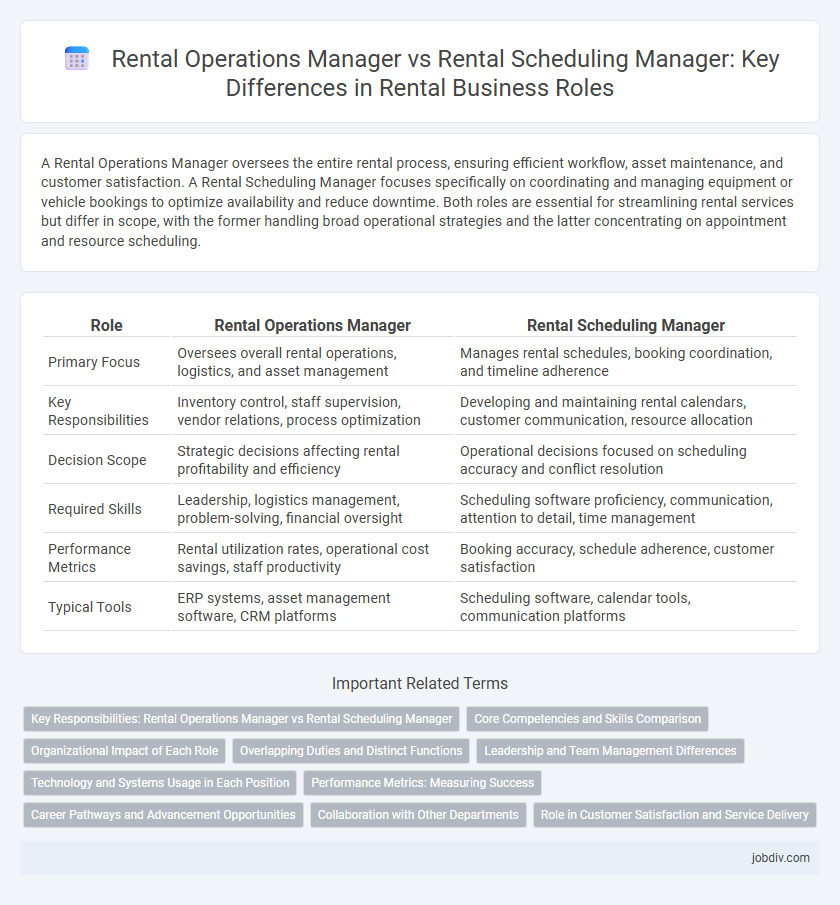A Rental Operations Manager oversees the entire rental process, ensuring efficient workflow, asset maintenance, and customer satisfaction. A Rental Scheduling Manager focuses specifically on coordinating and managing equipment or vehicle bookings to optimize availability and reduce downtime. Both roles are essential for streamlining rental services but differ in scope, with the former handling broad operational strategies and the latter concentrating on appointment and resource scheduling.
Table of Comparison
| Role | Rental Operations Manager | Rental Scheduling Manager |
|---|---|---|
| Primary Focus | Oversees overall rental operations, logistics, and asset management | Manages rental schedules, booking coordination, and timeline adherence |
| Key Responsibilities | Inventory control, staff supervision, vendor relations, process optimization | Developing and maintaining rental calendars, customer communication, resource allocation |
| Decision Scope | Strategic decisions affecting rental profitability and efficiency | Operational decisions focused on scheduling accuracy and conflict resolution |
| Required Skills | Leadership, logistics management, problem-solving, financial oversight | Scheduling software proficiency, communication, attention to detail, time management |
| Performance Metrics | Rental utilization rates, operational cost savings, staff productivity | Booking accuracy, schedule adherence, customer satisfaction |
| Typical Tools | ERP systems, asset management software, CRM platforms | Scheduling software, calendar tools, communication platforms |
Key Responsibilities: Rental Operations Manager vs Rental Scheduling Manager
Rental Operations Managers oversee the entire rental process, ensuring efficient asset utilization, managing client relations, and optimizing operational workflows to maximize profitability. Rental Scheduling Managers focus on coordinating rental schedules, managing inventory allocation, and ensuring timely delivery and pickup of rental equipment to meet customer demands. Both roles require strong organizational skills, but operations managers emphasize strategic planning while scheduling managers prioritize logistical execution.
Core Competencies and Skills Comparison
Rental Operations Managers excel in overseeing daily rental activities, managing inventory control, and optimizing operational workflows to increase efficiency and customer satisfaction. Rental Scheduling Managers specialize in coordinating vehicle or equipment availability, ensuring accurate booking, and resolving scheduling conflicts through advanced time-management and communication skills. Both roles require proficiency in logistics software, problem-solving abilities, and strong leadership, but Operations Managers focus more on strategic planning while Scheduling Managers emphasize precise coordination and resource allocation.
Organizational Impact of Each Role
Rental Operations Managers drive organizational efficiency by overseeing overall rental processes, managing inventory, and ensuring compliance with company policies, directly influencing profitability and customer satisfaction. Rental Scheduling Managers optimize the allocation and timing of rental resources, improving asset utilization and reducing downtime, which enhances operational flow and customer experience. Both roles are integral, with Operations Managers focusing on strategic oversight and Scheduling Managers ensuring tactical execution within rental organizations.
Overlapping Duties and Distinct Functions
Rental Operations Managers oversee overall rental workflows, inventory control, and customer service strategies, ensuring efficient resource allocation and operational compliance. Rental Scheduling Managers specialize in coordinating rental timelines, managing bookings, and optimizing equipment or vehicle availability to maximize utilization and minimize downtime. Both roles share overlapping duties in managing rental assets and client interactions, but Operations Managers focus on broader operational efficiency while Scheduling Managers concentrate on detailed scheduling and resource coordination.
Leadership and Team Management Differences
Rental Operations Managers oversee the entire rental process, managing cross-functional teams that handle inventory, customer service, and logistics to ensure seamless operations and profitability. Rental Scheduling Managers focus on coordinating and optimizing vehicle or equipment booking schedules, leading scheduling coordinators to maximize resource utilization and minimize conflicts. The key leadership difference lies in the broader strategic management role of the Operations Manager versus the specialized, tactical team leadership of the Scheduling Manager.
Technology and Systems Usage in Each Position
Rental Operations Managers utilize integrated enterprise resource planning (ERP) systems and advanced analytics platforms to oversee inventory management, billing processes, and customer relationship management, ensuring seamless operational workflows. Rental Scheduling Managers primarily rely on specialized scheduling software and real-time fleet tracking technologies to optimize equipment allocation, minimize downtime, and coordinate rental periods effectively. Both roles leverage digital tools, but Operations Managers focus on broader system integration while Scheduling Managers emphasize dynamic scheduling and resource utilization technologies.
Performance Metrics: Measuring Success
Rental Operations Managers are evaluated based on overall fleet utilization rates, maintenance turnaround times, and cost efficiency, directly impacting profitability and customer satisfaction. Rental Scheduling Managers focus on metrics such as booking accuracy, schedule adherence, and reduction of vehicle downtime to ensure optimal asset availability. Measuring success in these roles requires analyzing distinct performance indicators that align with operational control and scheduling precision within the rental business.
Career Pathways and Advancement Opportunities
Rental Operations Managers typically oversee overall rental processes, strategic planning, and team leadership, positioning them for senior management roles such as Regional Operations Director. Rental Scheduling Managers focus on optimizing booking systems, resource allocation, and daily scheduling efficiency, often advancing toward roles in logistics coordination or supply chain management. Career pathways diverge as Operations Managers lean toward broad organizational leadership, whereas Scheduling Managers specialize in operational efficiency, both offering distinct advancement opportunities within the rental industry.
Collaboration with Other Departments
Rental Operations Managers collaborate closely with maintenance, logistics, and finance departments to ensure efficient asset availability and cost control. Rental Scheduling Managers coordinate with sales, dispatch, and customer service teams to optimize equipment allocation and meet client demands promptly. Both roles require seamless interdepartmental communication to maximize rental utilization and customer satisfaction.
Role in Customer Satisfaction and Service Delivery
A Rental Operations Manager oversees overall rental processes ensuring efficient service delivery and customer satisfaction by managing inventory, staff, and operational policies. In contrast, a Rental Scheduling Manager focuses primarily on coordinating bookings and optimizing vehicle availability to minimize wait times and enhance customer experience. Both roles are critical, with the Operations Manager driving strategic improvements while the Scheduling Manager ensures seamless day-to-day rental scheduling and client interaction.
Rental Operations Manager vs Rental Scheduling Manager Infographic

 jobdiv.com
jobdiv.com